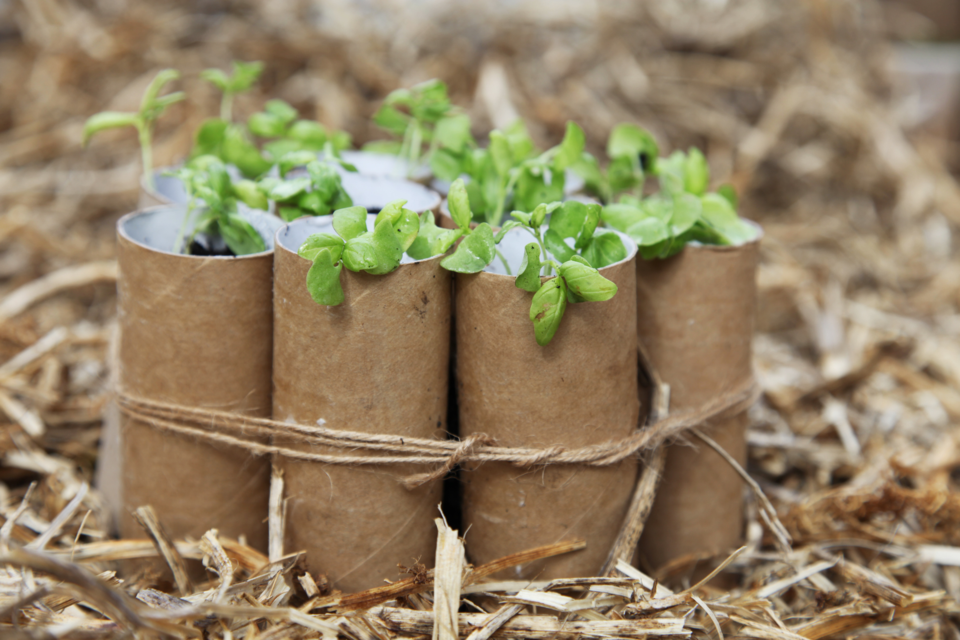Spring has sprung! Both the crocuses and those with green thumbs know it.
Garden projects dreamed up in the winter months can now begin to take root. As we plan out our veggie beds, floral displays and yard improvements, we probably don’t envision plastic littering our lawn or infiltrating the food on our plates. Nevertheless, plastic is handy and often comes as a side dish to gardeny endeavours.
Whether it’s a seed start container, soil bag or organics bin liner, plastic is everywhere. While some plastic is seemingly unavoidable, there are plenty of simple hacks to help reduce our dependence on it. Spoiler alert, using compostable plastic is not one of them.
With Seedy Saturday under our belt and the soil warming up, some of us are seeding early crops indoors and in greenhouses. Instead of buying new, seed trays from previous years can be reused or alternatives easily drummed up from your recycling bin.
Effective mini greenhouses can be fashioned out of plastic “clam shell” containers for salad and baked goods, and toilet paper rolls are great for plants with sensitive roots as you can transplant them directly into the soil. Folded newspaper can also be a simple but durable temporary seeding pot until it’s time to place starts in the thawed soil – check online for folding techniques.
Your recyclables are also handy for labelling seed trays. Think bread bag tags, strips cut from yogurt containers and mason jar lids. More longlasting and attractive labels can be made for your garden beds. Kids can paint rocks with images of the veggies and crafty gardeners can hammer old spoons flat and use typewriter letters to hammer on labels. The only limit is your imagination.
Ideally, keeping plastic out of the garden altogether is the best way to avoid microplastics getting into your soil and crops. Sun blasting on plastic pots, weed-suppression cloth, thick plastic greenhouse sheeting and plastic mesh deer fencing eventually weakens them, often rendering them useless in a season or two. Alarmingly, studies are revealing that plants and marine life are taking up microplastics into their cells and this means we are increasingly being exposed to them through our food and drinking water.
Cardboard and newspaper are fantastic plastic-free resources, too. They make an excellent weed suppressant once all tape and stickers have been removed. You might also still be able to get stashes of fall leaves from your lawn or a friend’s who might even have raked them into a tidy pile. When applied thickly, these insulate your early spring plants, suppress weeds and provide food for the soil as they break down.
Opt for metal, wood, glass and ceramic alternatives where possible. Fencing and greenhouses from these materials are an investment in time and muscle power but outlast their plastic counterparts by a long shot.
Whether you have a backyard compost or are gearing up to participate in the new curbside organics program in City of Powell River, you likely have a kitchen catcher for your food scraps. Even if tempted, keeping plastic out of these collection bins is essential to preventing plastic contamination of the resulting compost. Placing paper towels or newspaper at the bottom of the bin will help absorb liquids and make the catcher easy to empty.
The same goes for curbside carts. Plastic liners, including compostable ones, are not permitted by the city program. Instead, line the bottom of your bin with cardboard or newspaper. Rinse it out weekly and spritz with vinegar water to prevent odour.
Compostable plastic is not permitted in many municipal organics programs for a host of reasons. Distinguishing compostable plastic from non-compostable plastic is difficult at the best of times, let alone once mixed in with food scraps. Staff at composting facilities often give feedback about this reality.
Add to this the fact that even certified compostable plastics can take too long to break down in a high heat composting facility. As a result of these complexities, the provincial regulatory body for organics processing facilities, OMRR (Organic Matter Recycling Regulation) is addressing compostable plastics in its drafted updates.
OMRR has received strong feedback from compost operators and municipalities that compostable plastics are problematic and the regulatory body may be requiring additional measures to be taken by facilities that choose to accept them.
Keeping our compost free from plastic takes a community. Unwrap spoiled food from plastic packaging, remove plastic food stickers and place all compostable plastics in the garbage rather than your organics cart.
Happy plastic-free gardening in 2024!
Let’s Talk Trash is an award-winning team of environmental consultants who are working toward a world without waste. Learn more at LetsTalkTrash.ca or contact the team at [email protected].
Join the Peak’s email list for the top headlines right in your inbox Monday to Friday.




